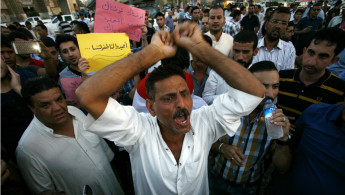Iraq parliament approves PM's anti-corruption plan
Iraq's parliament on Tuesday unanimously approved Prime Minister Haider al-Abadi's reform programme aimed at curbing corruption and reducing government waste that has sparked widespread anger and weeks of protests.
"It was unanimously approved," parliament speaker Salim al-Juburi announced to applause after the vote, which was held without a debate as soon as the plan was read.
| The problems in this country have become too many to list. And our leaders talk a great deal but then they do nothing to fix them |
The session opened with 297 of 328 MPs in attendance, according to Juburi.
Abadi on Sunday proposed a series of measures aimed at curbing corruption, streamlining the government and improving services after protests and a call from Iraq's top Shiite cleric Grand Ayatollah Ali al-Sistani for drastic change.
Juburi urged MPs to sign off on the reforms proposed by Abadi, which had already been approved by the cabinet, but said that more measures are needed.
Amid a major heatwave that has seen temperatures top 50 degrees Celsius (120 degrees Fahrenheit), protesters railed against the poor quality of services, especially power outages that leave just a few hours of government-supplied electricity per day.
In summary: the Iraqi government's five-point plan
Thousands of Iraqis braved the scorching summer heat last Friday to stage the huge protest in central Baghdad, calling on the prime minister to dissolve the parliament and sack corrupt government officials.
Security forces and riot police sealed off Iraq's iconic Tahrir Square and searched anyone who entered the area, but tens of thousands of men, women and children thronged the sprawling square, waving Iraqi flags.
"In the name of religion, the thieves robbed us," they chanted long into the evening.
Men with the government-backed Popular Mobilistion Forces, the umbrella group made up predominantly of Shia ilitias, pulled up in trucks and handed out ice water bottles to the protesters.
Their gesture was welcomed by roaring shouts in support of the paramilitary force now fighting the Islamic State group.
The PMU was hastily assembled last year, with pre-existing militias and new volunteers, to reinforce the Iraqi military after it crumbled in the face of the Sunni militant blitz that seized a third of the country.
"The government is robbing the Mobilistion Forces too!" the protesters cried, with many PMU fighters claiming they weren't receiving salaries promised to them.
"Change, that's what we need," said schoolteacher Najlaa Malek, one of the protesters said.
"The problems in this country have become too many to list. And our leaders talk a great deal but then they do nothing to fix them."
One man circled the square holding a mock donations box, with the written message: "proceeds go to the house of representatives."
The protesters represented mixed political and religious affiliations, organizers of the protest saying that about 75 percent were liberals, communists, linked to various political groups for youth, or independent.
Fadel el-Khafaji, a self-described liberal who has a degree in engineering, sells women's clothing, he said, because he can't find a job in his field.
The problems, he said, include "unemployment, general finances, human rights, where are the proceeds from our oil wealth, where is an end to this war we are living through?" he asked.
"The only solution is to dissolve the parliament and a restore presidential authority."





 Follow the Middle East's top stories in English at The New Arab on Google News
Follow the Middle East's top stories in English at The New Arab on Google News
![Israeli forces ordered bombed Gaza's Jabalia, ordering residents to leave [Getty]](/sites/default/files/styles/image_330x185/public/2176418030.jpeg?h=a5f2f23a&itok=_YGZaP1z)

